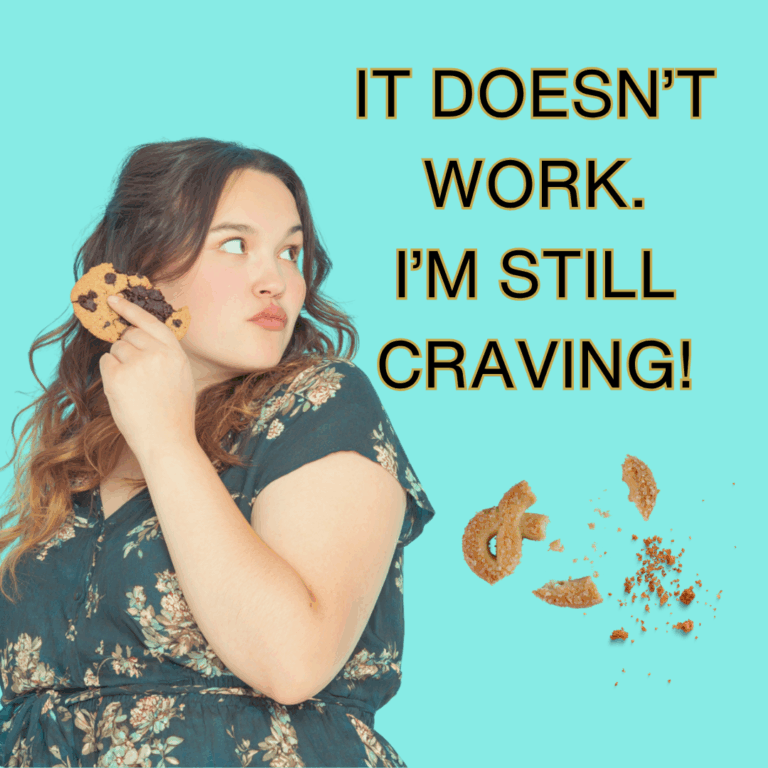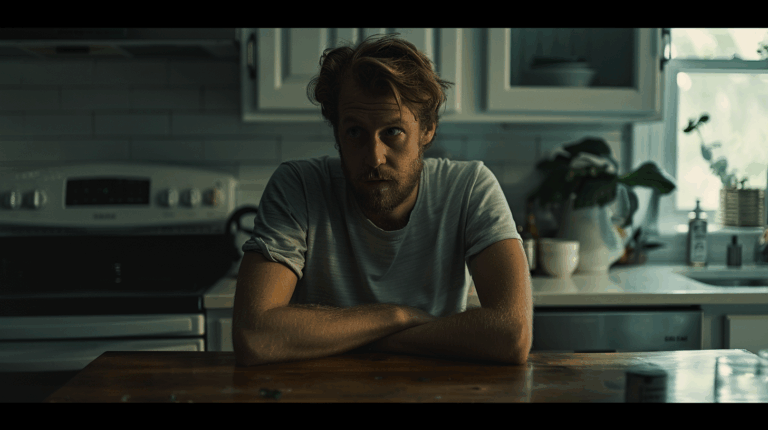By Mike, The SugarFreeMan
Founder of SugarDetox.com and the 30-Day Sugar Freedom Challenge
Why is this so darn hard?
Why, since the 1980s, have so many people gained so much weight?
Denial.
De-Nile is NOT a river in Egypt. Bad joke, I know.
But here’s what’s not a joke: denial is a symptom of the disease of addiction – a symptom whereby we deny that we have a problem.
It’s the wildest thing. You’ve seen it in alcoholics. You tell them they’re fired, you’re divorcing them, or they need to get their act together around the booze – and they say: “I don’t have a problem.”
You tell a diabetic they might die if they keep eating sugar, and they “try” for a few weeks but usually return to the same diet as before.
Die. You told them they might die. And they still ingest the stuff?

After 35 years sugar-free and helping tens of thousands of people break free, I’ve learned this: denial isn’t stupidity or weakness. It’s a protective mechanism your addicted brain uses to keep you using. And until you recognize it for what it is, you’ll stay trapped in the cycle.
This article was review by Dr. Camela McGrath, MD, FACOG. Find more about her here
What Sugar Denial Actually Looks Like
“But I’m not an addict or anything.”
Hear it all the time.
“I just like my sweets. I’ve always just had a sweet tooth.” (I freaking hate that saying.)
Or maybe you say:
- “I can quit anytime I want, I just don’t want to right now.”
- “It’s not like I’m eating candy bars all day.”
- “I just need it with my coffee in the morning.”
- “Everyone eats sugar, it’s normal.”
- “I’ve tried quitting before and it wasn’t that hard.”
- “I just have a little bit, it’s not a big deal.”
- “I eat healthy most of the time.”
- “It’s not affecting my life.”
Every single one of these statements is denial in action.
And I can say that with confidence because I’ve heard them thousands of times – often from people who are overweight, pre-diabetic or diabetic, struggling with fatigue and brain fog, and feeling miserable in their bodies.
But they “don’t have a problem.”
The Anatomy of Sugar Denial
Denial isn’t lying. That’s important to understand.
When you’re in denial, you genuinely believe what you’re saying. Your brain has convinced you that you don’t have a problem, even when all evidence points to the contrary.
Research from the National Institutes of Health shows that sugar activates the same brain pathways as cocaine and other addictive drugs. Like all addictions, sugar addiction comes with denial as a core symptom.
Here’s how it works:
1. Minimizing
“It’s not that bad. Sure, I have dessert every night, but it’s not like I’m binging on candy.”
2. Comparing
“My coworker eats way more sugar than I do. At least I don’t drink soda.”
3. Rationalizing
“I deserve this. I’ve had a hard day. I work hard – I should be able to enjoy something.”
4. Deflecting
“The real problem is stress/my job/my kids/my spouse. If that were better, I wouldn’t need sugar.”
5. Future-Promising
“I’ll quit after the holidays. I’ll start on Monday. I’ll deal with it when things calm down.”
Sound familiar?
Why Your Brain Creates Denial (And Why It’s So Convincing)
Your brain isn’t trying to hurt you with denial. It’s actually trying to protect you – or at least protect its access to sugar.
Your Addicted Brain Has One Job: Keep You Using.
The addicted part of your brain doesn’t care about your long-term health, your weight, or your self-respect. It only wants one thing: more sugar.
Denial is one of the tools your brain uses to ensure continued access.
Acknowledging Addiction Feels Scary
Admitting you’re addicted to sugar means:
- You’re not in control
- You’ll have to change
- You might fail
- You’ll have to face emotions you’ve been numbing
- You’re not “normal”
- You need help
So your brain whispers: “You’re fine. It’s not that bad. You’re different.”
The Cultural Denial That Reinforces Your Personal Denial
Here’s what makes sugar denial even more insidious: our entire culture is in denial about sugar.
Unlike alcohol or drugs, sugar addiction isn’t taken seriously.
Consider:
- Doctors say “eat sugar in moderation.”
- Nutritionists promote “balance.”
- Food industry funds misleading studies.
- Government allows 10% of calories from added sugar.
- Friends pressure you to “just have one bite.”
- Media repeats “everything in moderation.”
When the world says sugar isn’t a problem, it’s easy to stay in denial.
But here’s the truth: for sugar addicts, moderation doesn’t work.
Harvard Medical School confirms excess sugar consumption links to obesity, diabetes, and heart disease.
The Rock Bottom Myth (And Why You Don’t Need to Hit It)
Usually, people say you must “hit rock bottom” to recover.
To that, I say – hogwash.
The elevator stops on every floor.
You don’t need to crash. You can just push the button for the first floor and walk out with dignity.
Rock bottom is wherever you decide to stop digging.
What Rock Bottom Actually Looks Like

For some people, it’s:
- A diabetes diagnosis
- Not fitting in an airplane seat
- Seeing a photo they don’t recognize
- Their child asking, “Why do you eat so much candy?”
- Realizing it’s been 20 years of “I’ll start Monday”
- Waking up after a binge feeling disgusted
- Being told they need medication
But you don’t have to wait for that.
You can decide right now.
Join our 30-Day Sugar Detox Challenge – get structure, support, and community to finally quit sugar for good.
How to Break Through Your Sugar Denial
1. Get Brutally Honest About Your Sugar Consumption
Track everything for one week – even the “healthy” sugars. Awareness breaks denial.
2. Ask Yourself the Hard Questions
If you’ve ever promised to quit “later,” you already know the answer.
3. Try Complete Abstinence for 7 Days
If sugar isn’t a problem, this should be easy. Spoiler: it usually isn’t.
4. Listen to Your Body, Not Your Brain
Your brain lies; your body doesn’t.
5. Get an Outside Perspective
Ask someone you trust what they see.

We Need to Deal in Reality, Folks
Today is the someday you’ve always talked about.
Not tomorrow. Not Monday. Not “after the holidays.”
You want to feel what sugar freedom feels like.
So, not to sound like Nike but…
Just do it.
What Happens When You Break Through Denial
- Relief – The exhausting work of denial ends.
- Clarity – You finally understand the “why.”
- Direction – You realize you need recovery, not another diet.
- Hope – Because now change is possible.
- Action – Truth creates movement.
No More Delays, No More Excuses
I’ve been doing this for 35 years. I can spot denial from a mile away.
And it breaks my heart to see people still suffering, still insisting they’ll “deal with it later.”
Because I know what’s possible: freedom, energy, confidence.
But you can’t get there while you’re still in denial.
The Cost of Staying in Denial
- Years of your life – how long have you said “someday”?
- Your health – every day on sugar is another day of damage.
- Your confidence – denial destroys self-trust.
- Your relationships – denial creates distance.
- Your dreams – your best self is waiting.
How much longer will you pay this price?
The Gift of Breaking Through Denial
- Truth – You finally see clearly.
- Power – You can change what you acknowledge.
- Freedom – From the lie.
- Support – Help becomes possible.
- Progress – Real, lasting change.
- Peace – From alignment with truth.
Join the 30-Day Sugar Detox Challenge – You don’t have to do this alone.
Today is Your Someday
Every person who broke free from sugar addiction did one thing: they broke through denial.
Not by hitting rock bottom.
Not by luck.
But by admitting the truth.
So I’m asking you:
Are you ready to stop minimizing, rationalizing, and deflecting?
Are you ready to face your sugar addiction – and your freedom?
If yes – today is your someday.
See you on the inside.
About the Author
Mike Collins, known as “The SugarFreeMan,” has been sugar-free for over 35 years and is the founder of SugarDetox.com. He’s helped tens of thousands of people overcome sugar addiction through evidence-based nutrition and behavior strategies.
Medical Disclaimer
This article is for educational purposes only and does not replace professional medical advice. Always consult your healthcare provider before making major dietary changes.
FAQ
Q: What is sugar denial and how does it work? A: Sugar denial is a symptom of sugar addiction where your brain convinces you that you don’t have a problem, even when evidence suggests otherwise. It manifests through minimizing consumption (“it’s not that bad”), comparing yourself to others who eat more, rationalizing use (“I deserve this”), deflecting blame to external circumstances, and future-promising (“I’ll quit after the holidays”). Denial protects your brain’s access to sugar by keeping you partially blind to reality.
Q: What are common signs that I’m in denial about sugar addiction? A: Common denial statements include “I’m not an addict, I just like sweets,” “I can quit anytime,” “Everyone eats sugar,” “It’s not affecting my life,” and “I just have a sweet tooth.” If you’ve tried to cut back and failed, think about sugar more than you’d like, eat it even when you don’t want to, hide consumption, feel guilty but do it anyway, or get defensive when someone suggests you eat too much – these indicate denial about a real problem.
Q: Do I need to hit rock bottom before I can quit sugar? A: No – this is a myth. The elevator stops on every floor, meaning you can decide to quit at any point without waiting for a crisis. Rock bottom is wherever you decide to stop digging. You don’t need to crash into the basement to start recovery. You can push the button for the first floor right now and walk out with your dignity and self-respect intact, then begin changing your life.
Q: How can I break through my sugar denial? A: Break through denial by: 1) Tracking every sugar consumption for one week to face reality, 2) Honestly answering hard questions about your relationship with sugar, 3) Trying complete abstinence for 7 days (if you can’t or experience withdrawal, that’s addiction), 4) Listening to your body’s signals instead of your brain’s rationalizations, and 5) Asking someone who loves you if they think you have a problem, then listening without defending.
Q: Why does cultural denial make personal sugar denial worse? A: Unlike alcohol or drugs where society acknowledges addiction is real, sugar addiction isn’t taken seriously culturally. Doctors recommend “moderation,” nutritionists say “all foods fit,” the food industry funds pro-sugar studies, and friends pressure you to “just have one bite.” This cultural denial that sugar addiction exists reinforces your personal denial and makes it harder to recognize you have a problem that requires complete abstinence, not moderation.
Q: What happens after you break through sugar denial? A: Breaking through denial brings relief (the exhausting work of lying to yourself is over), clarity (failed diets now make sense – it was addiction, not lack of willpower), direction (you need recovery and support, not another diet), hope (you can finally address the problem properly), and action (truth creates movement while denial keeps you stuck). Most people feel surprisingly relieved when they finally admit the truth.





